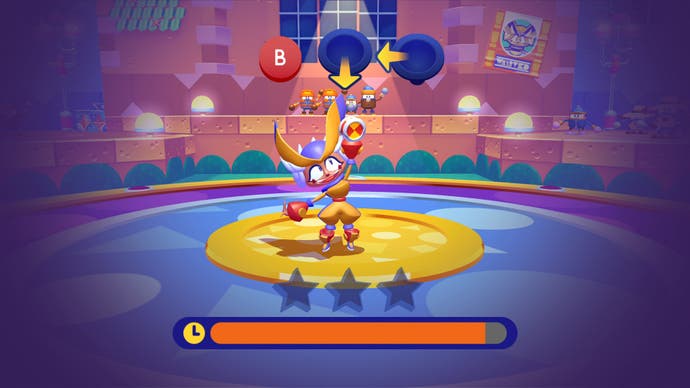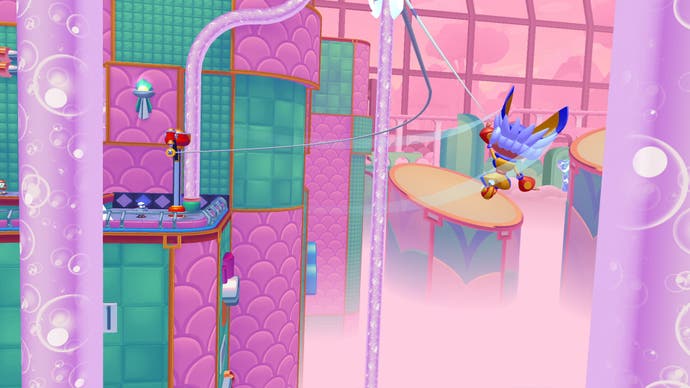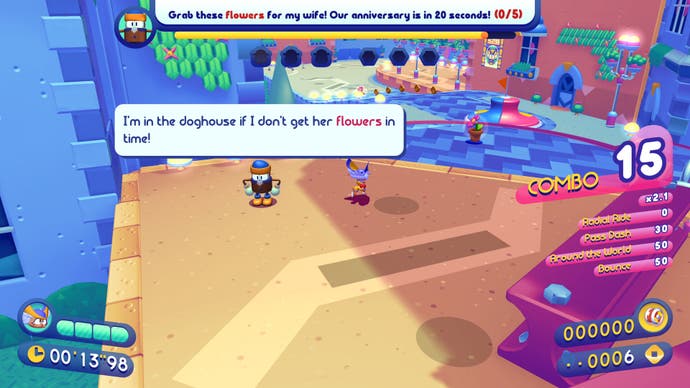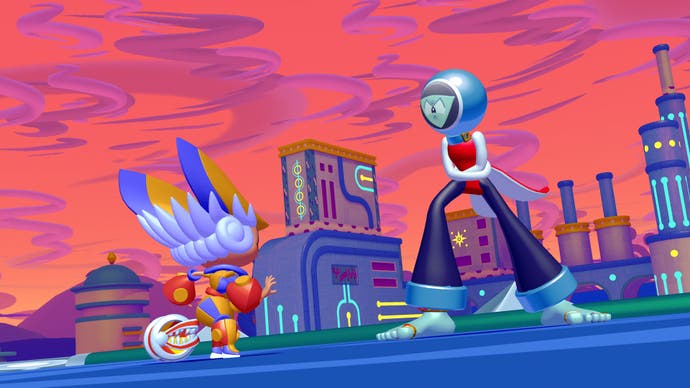An ingenious combo-driven challenge that’s speedy and fun.
Whenever I first get to play a new Mario Kart game there’s always a moment – often when I reach a Bowser stage – where I look at the road ahead of me, the broad, curving path that leads through gorgeous Mario clutter, and I wish I was playing this as an action game, a platform game, instead of a driving game. What would that be like?
I don’t mind that it probably wouldn’t work, or that it works perfectly well as it is. I don’t fully know what I’m responding to, even. Maybe it’s the sense of being low to the ground in a world that unfurls towards the horizon, a world which is pushing me forwards to adventure. I don’t get this from actual 3D Mario games, which tend towards the toybox-like. But I get it from Penny’s Big Breakaway. In a strange, hard-to-pin-down manner, it’s the action game I want when I play Mario Kart.
This is weird, because the clearest lineage here is Sonic. With its play of speed and momentum and inertia, Penny’s Big Breakaway feels like a Sonic game moment-to-moment, and then there’s the personnel behind it, with Christian Whitehead and other Sonic Mania vets at the top of the credits. The colour scheme, favouring oranges and pinks and greens and purples calls to mind the 16-bit glory days of Sega. There’s a lot of Marble Zone to the look, even before later levels dump in all that lava. Coin collection gives off a distinct golden rings chime. Squint, and the characters scattered around the place, squat and rounded, could have come from Bonanza Bros, while Penny herself, all giant grin and sharp angles, feels like she could have stepped out of a Treasure game.
All of which is to say, I guess, that we’re in nostalgia territory here, as we often are when 3D platformers are involved. But what marks Penny’s Big Breakaway out, I think, isn’t the way it looks back. It’s the way all this stuff make sense for the present.
As the involvement of Whitehead suggests, this is a game that encourages flair in its players. It’s one for the speedrunners, the short-cut finders, the combo-builders. You can see this in the moveset, which gives you the basic jumps and attacks but throws in the main character’s signature yo-yo to mix things up. So you have a jump, a double jump, and an arcing yo-yo swing that gives you extra reach. You can run, or you can hop on your spinning yo-yo and ride it like a dinky chariot. This gives you a burst of speed that you can then try to keep alive as long as possible. Combat allows you to strike out with the yo-yo but also spin it around in a wide arc, a great help given the game’s penguin foes who attack en-masse and from all sides. Elsewhere the yo-yo gives great options for sudden bursts of speed, direction changes and environmental interaction. All of this stuff gives you options, but requires dexterity in return, particularly since the game really wants you to chain everything together to grow huge combos as you race around.


And the levels make the most of this too. I really love Penny’s level design, which tends to be broad with the promise of secret areas. Cityscapes, beach communities, huge sci-fi kitchens; like Mario Kart again, there’s always such a lot laid out in front of you, and you often have a degree of freedom in how you move forward. The automatic camera is surprisingly good at framing the action and choosing viewpoints, while you move from penguin combat arena to sloping hill, mega-cliff, and chicane. Some levels feel like golf courses as you roll the yo-yo chariot over perfectly sculpted humps of grass. Others throw in bizarre details like diving boards or cast iron frying pans that wobble underfoot as you move back and forth in them. One minute you’re precision jumping between bounce pads or swinging construction platforms, the next you’re racing down a curving channel, avoiding penguin baddies who have brought nets, or being chased by a boss in the form of a huge bait-ball of enemies.
The themes shift from water and sand to lava and sci-fi treadmills, but what remains the same is the broad approach, the scattering of collectibles and side-quests in each level, the vibrant colour scheme and the focus, should you want it, on finding a racing line through all this muddle, powered by your yo-yo moves, and making the best possible time with the best combo possible. The game never forgets that yo-yo. Even outside of the combo chasing and the nuance and challenge it brings to simple jumps and flips, it allows you to latch onto power-ups, like one that turns you into a chilli pepper or another that lofts you high into the air. Then there are the gymnast poles you can grab onto and swing, the screws and bounce ropes that you can yo-yo onto to shoot yourself into the troposphere, the constant need to think about moving up, perhaps, as well as forward.


It’s a lot to take in, and there are a handful of difficulty spikes that I encountered, often around bosses, and sometimes around moments where I needed to ride the yo-yo chariot over water or lava and maintain momentum. But that play of momentum, that learning how to build it up and maintain it, is at the heart of why this is fun. It’s the thing that flings you through this chunky, luridly coloured platforming world, and it provides those magical moments where the clutter and excess and collectables sort of iris out and you just see an ingenious path to the exit, a path written in yo-yo hops and twists.
Oh and the exit of each level itself tends to be a multi-tiered cake, which you jump onto, as high as you can, and then perform a bunch of yo-yo tricks to knock your score even higher. Of course there’s a cake at the end. It’s Sega-thinking. It’s purple-and-pink sky thinking. It’s a deliriously creative and challenging platform game. It’s odd and funny and a total delight.










Add comment